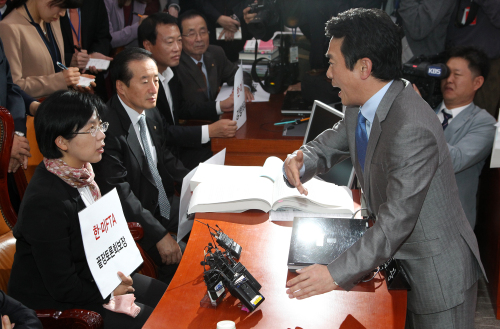Committee to hold more debates on Korea-U.S. FTA later this week
The parliamentary committee on foreign affairs, trade and unification on Tuesday decided to extend the debate on the Korea-U.S. free trade agreement Thursday and Friday before voting on the bill, as opposition lawmakers boycotted a committee session.
The ruling Grand National Party, which controls 18 of the 28 seats on the committee, had sought to put the FTA bill to vote Tuesday, a week after the U.S. Congress ratified it, but their plan was delayed due to physical obstruction by members of the main opposition Democratic Party and minor Democratic Labor Party. DLP leader Lee Jeong-hee sat on the committee chief’s chair and refused to move.
“We will debate for two days and debate more if necessary,” Rep. Nam Kyung-pil, head of the committee and member of the GNP’s supreme council, said Tuesday.
A subcommittee under the panel had already hosted a debate on Monday which ended up with outside experts against the FTA walking out in the middle, taking issue with time limits for speeches.
About the opposition legislators’ occupation of his seat, Nam said he was “ashamed and will not let it pass.”
“We have made a promise to not railroad bills with physical force, but the use of physical force by a minority is hindering democracy,” Nam said.
“I will no longer tolerate such behavior. I will prevent it.”
 |
Grand National Party Rep. Nam Kyung-pil (right), chairman of the parliamentary committee on foreign affairs, trade and unification, demands Democratic Labor Party leader Lee Jeong-hee vacate his seat at the committee session Tuesday. Opposition lawmakers boycotted the committee meeting as the GNP sought to vote on the Korea-U.S. FTA bill. (Yonhap News) |
GNP chairman Hong Joon-pyo said earlier Tuesday that his party was determined to have the FTA bill ratified within October after the Oct. 26 by-elections. The majority GNP is expected to push for the bill’s passage at the National Assembly’ plenary session on Oct. 28.
Rep. Nam said that Seoul was in talks with Washington over a part of the opposition parties’ demands for renegotiation on 10 clauses of the FTA.
“We already said we accept the opposition’s demands for back-up measures,” Nam said in a radio interview Tuesday, referring to the calls for legislation to allow the National Assembly to take part in trade negotiations and strengthening a system for mediating on behalf of Korean industries.
Nam said his party saw the DP’s resistance to the Korea-U.S. FTA as a political move to tout unity with other opposition parties ahead of the Seoul mayoral by-election next Wednesday.
“If they repeat the use of physical force and engage in scuffles in the voting process, the people will simply turn away from them,” he said.
DP floor leader Kim Jin-pyo said Tuesday that his party was firmly against the passage of the FTA bill until the 10 clauses were removed and the two measures were taken.
The GNP is to consider sending a letter to Washington for its attention on two of the opposition’s demands ― to recognize products manufactured in South Korean-run factories at North Korea’s Gaeseong industrial park as South Korean-made, and to remove clauses on investor-state disputes. The ISD system allows U.S. investors to seek settlements on disputes with the Korean government in the courts of a third country.
The DP is calling for the abolition of the ISD system saying that it could obstruct Korea in executing its own policies. In addition, the opposition argues that U.S. firms looking to enter areas deemed to be suitable for small businesses by the Korean government could see the special treatment of SMEs as non-tariff barriers, which could prompt U.S. investors to seek settlement through the ISD system.
The ministry is disputing such claims saying that the ISD system is an international standard, which is included in 85 trade agreements Korea has formed over the years.
The Seoul government has maintained that the agreement with the U.S. allows for related issues to be discussed after its implementation. In addition, the Trade Ministry has called any attempts to gain South Korean status for Gaeseong products while North Korea continues with its aggression “unrealistic.”
South Korean Trade Minister Kim Jong-hoon reaffirmed on Monday that reopening of talks on a free trade deal with the United States is “impossible and unrealistic” at this point.
“Calls for the renegotiation are impossible and unrealistic at present, but the government is working to produce more supportive measures for the industries expected to be damaged by the FTA,” Kim said in a meeting with senior journalists.
The U.S. Congress passed the bilateral free trade pact, signed in 2007 and revised late last year, on the eve of President Lee Myung-bak’s summit talks with U.S. President Barack Obama last week.
Lee on Tuesday urged the National Assembly leadership to get the FTA ratified during a luncheon meeting at Cheong Wa Dae.
Korean Ambassador to Washington Han Duck-soo said the U.S. Congress would not have passed the FTA until late October had Lee’s four-day trip to the U.S. capital last week not been scheduled.
“The Democratic Party and the Republican Party fully supported (the FTA) to wrap up the process before President Lee’s state visit,” Han told reporters. “Of course, President Lee’s visit made it possible.”
Han said his Colombian and Panamanian counterparts in the U.S. capital expressed their gratitude for Lee’s trip. The U.S. FTAs with the two nations were ratified by Congress along with South Korea’s.
By Kim So-hyun (
sophie@heraldcorp.com)








